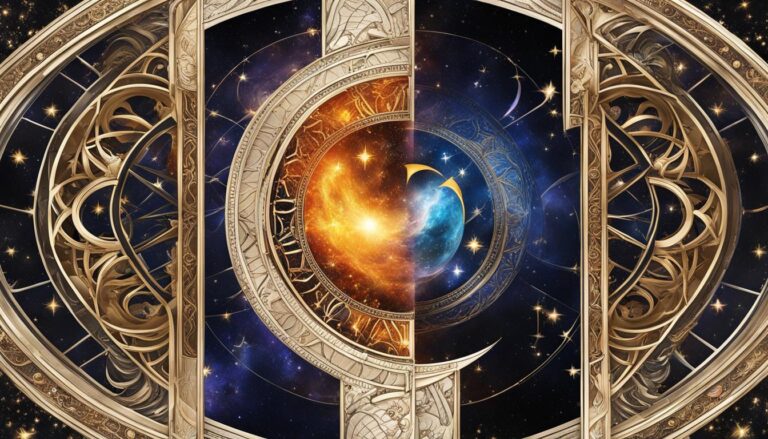What Does the Bible Say About Astrology?
Astrology has been a topic of fascination for centuries, with people seeking insights into their personalities, relationships, and future through the alignment of celestial bodies. But what does the Bible, a central religious text for Christians, say about this practice? Let’s explore the biblical perspective on astrology and its relevance to Christianity.
Key Takeaways:
- The Bible condemns astrology as a source of false guidance (Isaiah 47:13-15).
- Astrology originated in ancient Babylon and was considered a form of divination.
- God strictly prohibits divination and sorcery in the Bible (Leviticus 19:26).
- Astrology’s limitations are highlighted through King Nebuchadnezzar’s dream, where astrologers were unable to interpret it.
- The Bible acknowledges the beauty and significance of the stars but emphasizes trust in God instead of astrological beliefs.
Astrology in the Bible
Astrology has a long history dating back to ancient Babylon, which is now modern-day Iraq. Excavations have unearthed cuneiform tablets containing horoscope charts that date as far back as the 5th Century BC and even earlier. The Babylonians practiced astrology as a form of divination, believing that the positions of celestial bodies held influence over individuals and the course of human affairs.
The Book of Daniel in the Bible also mentions astrology. King Nebuchadnezzar, the king of Babylon, summoned astrologers to interpret a dream he had. This biblical account provides further evidence of the prevalence of astrology in ancient civilizations. However, it is important to note that the Bible does not endorse or support the practice of astrology.
Astrology may have been widely practiced in ancient times, but from a biblical perspective, it is not seen as a valid source of guidance or truth. The Bible discourages consulting with astrologers or relying on astrology to shape one’s decisions and future. Instead, the Bible emphasizes the importance of seeking wisdom and guidance from God. By trusting in God’s plan and relying on His wisdom, believers are encouraged to navigate through life.
To delve deeper into the biblical perspective on astrology, it is essential to explore the various passages and teachings that highlight the limitations and potential dangers of relying on astrology rather than seeking divine guidance. By understanding the biblical stance on astrology, believers can make informed choices that align with their faith and trust in God’s ultimate authority.
What is Astrology?
Astrology is a form of divination that attempts to predict future events or reveal hidden knowledge through the interpretation of celestial bodies. It is rooted in the belief that the positioning and movement of the stars and planets influence human lives and affairs. Astrologers analyze the positions of these celestial bodies at the time of a person’s birth to determine their personality traits, life events, and compatibility with others.
Understanding Divination
Divination, including astrology, is a practice that involves seeking insight and guidance from supernatural forces or higher powers. In astrology, this is done through the study and interpretation of the stars. However, it is important to note that divination is considered a practice prohibited by God in the Bible.
- The book of Leviticus, chapter 19, verse 26, states: “Do not practice divination or seek omens.”
- Divination is also mentioned in Deuteronomy 18:10-12, where it is described as an abomination in the eyes of God.
- Throughout the Bible, there are warnings against imitating the practices of other nations, including those who practiced sorcery and divination.
These biblical passages make it clear that divination, including astrology, is not aligned with the teachings and principles of Christianity. The focus should be on seeking guidance from God rather than relying on supernatural practices.
As Christians, it is essential to understand and appreciate the biblical stance on astrology and divination. Rather than putting faith in the movements of the stars, we are encouraged to place our trust in God and seek His guidance through prayer, scripture, and the wisdom of wise and godly individuals. By doing so, we can navigate through life with a firm foundation based on the principles and values of our faith.
Is Astrology Real?
When King Nebuchadnezzar found himself unable to interpret his dream, he turned to the astrologers for their expertise. However, they were unable to provide him with an answer. It was only through the intervention of Daniel, a prophet of God, that the dream was interpreted, revealing its true meaning. This biblical account highlights the limitations of astrology and underscores the belief that God alone has the power to unlock secrets and provide genuine guidance.
The story of King Nebuchadnezzar’s dream showcases astrology’s shortcomings when it comes to deciphering the influence of the stars. While astrology may claim to offer interpretations of celestial movements and their impact on human affairs, the Bible reminds us that true insight and wisdom come from divine revelation. It is God who possesses the ability to reveal the hidden truths that lie behind the veiled meanings of dreams and astrological signs.
By showcasing the ineffective nature of astrology in comparison to God’s wisdom and genuine prophetic revelation, the Bible emphasizes the importance of putting our trust in the One who has ultimate knowledge and understanding. Instead of relying on the interpretation of stars’ influence, we are invited to seek guidance from God, who alone can provide us with true direction and purpose.

Signs and Navigation
In addition to their awe-inspiring beauty, stars have played an essential role in navigation throughout history. Sailors, merchants, and explorers have relied on the stars to navigate and determine their positions at sea or on land.
Furthermore, the Bible mentions celestial events related to the stars in connection with the end times. Matthew 24:29 states, “Immediately after the tribulation of those days the sun will be darkened, and the moon will not give its light, and the stars will fall from heaven, and the powers of the heavens will be shaken.”
This biblical passage suggests that celestial signs and events involving the stars will occur as signs of the end times, underscoring their significance in biblical prophecy.
Summary
- The stars are celebrated in the Bible as part of God’s magnificent creation.
- Stars, along with the sun and moon, mark time, seasons, and serve as navigational aids.
- These celestial bodies showcase the wonders of the universe and God’s power.
- Stars have been used for navigation by sailors and explorers throughout history.
- Biblical prophecy suggests that celestial events involving the stars will be signs of the end times.
Conclusion
After examining the biblical perspective on astrology, it becomes clear that the practice is discouraged and carries certain limitations. The Bible emphasizes that astrology should not be relied upon for guidance or to shape one’s destiny. Instead, individuals are encouraged to trust in God’s plan for their lives and seek His wisdom and guidance.
Astrology, as a form of divination, seeks to interpret the influence of celestial bodies on human affairs. However, the Bible categorizes divination as a prohibited practice, along with sorcery and other detestable ways. It is important to remember that God alone has the power to reveal secrets and provide true guidance.
The limitations of astrology are further demonstrated in the story of King Nebuchadnezzar’s dream. When the astrologers were unable to interpret the dream, it was Daniel, a prophet of God, who was able to provide the correct interpretation through divine revelation. This highlights the superiority of God’s wisdom over astrology.
In conclusion, the biblical perspective on astrology urges individuals to place their trust in God rather than relying on astrological beliefs or practices. By acknowledging the limitations of astrology and embracing God’s sovereignty and authority, individuals can find true guidance and peace in their lives.
FAQ
What does the Bible say about astrology?
The Bible discourages the practice of astrology and divination, emphasizing the limitations of astrology compared to the wisdom and guidance of God.
Is astrology mentioned in the Bible?
Yes, astrology is mentioned in the Bible, specifically in Isaiah 47:13-15 where it is condemned as a source of false guidance.
What is astrology?
Astrology is a form of divination that attempts to predict future events or reveal hidden knowledge through the interpretation of celestial bodies.
Is astrology real?
While astrology was prevalent in ancient civilizations and is still practiced today, the Bible showcases astrology as ineffective compared to God’s wisdom and the genuine prophecy.
What is the biblical perspective on astrology?
The Bible discourages consulting with astrologers or relying on astrology for guidance, emphasizing the belief that God alone has the power to reveal secrets and provide true guidance.
What is the significance of stars in the Bible?
The Bible acknowledges the beauty and majesty of the stars as part of God’s creation, describing them as lights created by God to mark time, seasons, and serve as navigational aids.
Should Christians believe in astrology?
Believing in astrology and relying on zodiac signs to shape one’s destiny goes against the biblical notion of God’s sovereignty and authority. The Bible encourages individuals to trust in God’s plan for their lives rather than seeking guidance from astrological beliefs or practices.
Is astrology considered a practice prohibited by God?
Yes, divination, including astrology, is considered a practice prohibited by God in the Bible. Leviticus 19:26 clearly states that divination and sorcery are not to be practiced.







